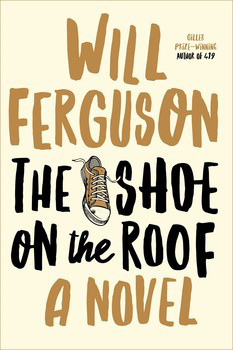
For many of us who read, we have to admit we have problems grasping the way the world around us works. Is there something wrong with our minds when we do something foolish or make people around us shake their heads? And when everything in our lives – relationships, jobs, family, health – seems to build into one unsurmountable crisis after another, do we hang our hang our heads and surrender to the evils of the world. Or do we read in order to better understand ourselves and try to deal with those issues. Of course we do. But what happens when we encounter a novel in which the plot makes us truly question our take on the reality of our realities? Hmmm. So how should we really take Will Ferguson’s The Shoe on the Roof?
Page 3 Chapter One
The one almighty fact about love affairs is that they end. How they end and why, although of crucial interest – indeed, agony – the participants, is less important than that they end. Marriages might linger like a chest cold, and there are friendships that plod along simply because we forget to cancel the subscription. But when love affairs collapse, they do so suddenly: they drop like swollen mangoes, they shatter like saucers, they drown in the undertow, they fall apart like a wasp’s nest in winter. They end.
Thomas knew this, and yet . . .
Will Ferguson’s prose always seems to have these elements of profound thoughts that all-of-a-sudden end with phrase that comes across like a dull thud. And this book is filled with such sections. The story deals with Thomas Rosanoff. He spent his younger life as a test subject for his father’s psychiatric tests which was the subject for a best-selling book. Now younger Thomas tries to escape that shadow that being ‘the boy in the box’ by trying his own hand at medical studies. But when his girlfriend ends their relationship, he decides to try his own hand at researching cures by bring in three homeless men who claim they are the living embodiment of Jesus Christ. But as things slide further and further into chaos for poor Thomas, he finds he must not only clean up the mess he has created but also deal with the voices inside his own head.
Pages 109-110 Chapter Seventeen
Is identity immutable? Or is it malleable? Is it transitory and temporary – something to be donned or discarded at whim – or is it woven into our DNA? Does it even exist? Perhaps identity is simply an agreed-upon fiction, a conglomerate of traits.
Thomas knew full well that the defining characteristic of our interconnected online age isn’t anonymity but reinvention. You don’t cloak who you are: you change who you are. In the either/or of binary equations, you can hide in plain sight, can dress yourself in layers: a dance of the seven veils in reverse. You can even claim the identity of someone else entirely. Your father`s say.
Two weeks, top. That was how much time Thomas figured he would need. A provisional custody order (one month, on review) would be more that sufficient. How much time do you need to jolt someone out of a falsely held identity?
He was equally sure that the request would go through without a ripple. Why wouldn’t it? It wasn’t as though people were constantly stealing mental patients. Far from it. Hospitals were always looking for people to take custody of intractable cases – family, relatives, halfway homes, community groups. It was a matter of paperwork, of filling in the right forms, clicking on the right boxes. No one would step back to look at the larger picture. No one would ask why a patient was being released into the care of one Thomas Aaron Ronsanoff.
Like Ferguson’s previous works, there are moments of profound insights while chaos and hilarity ensues. There are no deep truths however, more of a realization and a matter-of-fact observations about the human condition. In short, of moments of ‘hmm’ and `ah-hah’ that a reader will note before a page is turned.
Page 360
Outside in the dusty heat of summer, a city bus rattled past smokestacks and warehouses, straining uphill and then fighting its own momentum on the way down. (He) was inside, dressed in factory blues, toolbox on his lap.
The driver looked at him in the bus’s rearview mirror. “You seem familiar. Do I know you?”
“Maybe,” (He) said softly. “I used to be somebody.”
And the bus trundled into the haze.
But there is a serious note of truth in this fiction. The scenes have a sense of familiarity to them as do many of the situations that poor Thomas finds himself in. This is a good read for sure. One that makes anybody laugh and think at almost the same time.
Page 369 Acknowledgements
This book began with a story my mother told me. My mom, Lorna Louse Bell, worked as a psychiatric nurse at the Weyburn Mental Hospital in the 1950s under Dr.Humphry Osmond. She often spoke about her time at Weyburn and the stories she shared with us were, by turn unsettling, heartbreaking, occasionally uplifting, and at times inspiring . . . Although inspired by these stories, The Shoe on the Roof remains a work of fiction.
So I have to admit that Will Ferguson’s The Shoe on the Roof is certainly a unique and enjoyable read. Like Ferguson’s previous work there are certainly moments of profound insights followed by serious, simple thuds of truths. In short, a good read.
*****
Link to Simon and Schuster Canada’s website for The Shoe of the Roof
Link to Will Ferguson`s website
Share this:- More






